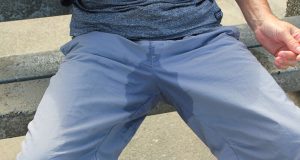By Nabil Mockbil
Guest Writer
 There is a rapidly growing number of seniors (aged 65 and older) in the general population. The “silver tsunami” is a term that has been coined to refer to this growing population of older people. The impact is enormous because it is rearranging many industries like healthcare, anti-aging and even dental care.
There is a rapidly growing number of seniors (aged 65 and older) in the general population. The “silver tsunami” is a term that has been coined to refer to this growing population of older people. The impact is enormous because it is rearranging many industries like healthcare, anti-aging and even dental care.
There is no reason for elderly people to have poor oral health. With the correct preventative and care measures, this demographic can still enjoy great dental health, unlike older people from previous generations.
How is dental health different in older people?
Most older people have medical conditions, associated with aging, such as hypertension, arthritis, heart disease or diabetes and take medication for them. These medications may impact the senior patient, by having side effects, which can directly affect their mouth health.
A common side effect is dry mouth, which is caused by medicines, such as antihypertensives and antidepressants. These two categories of medicines are used widely in older patients.
Aging may cause certain physical or mental impairments that can affect how the individual maintains daily oral hygiene, for example: limited joint mobility will make brushing teeth and regular flossing a challenge, age-related hearing loss will make communication difficult.
Any mental impairments like dementia will make it difficult for the dentist to educate and communicate with the patient, to ensure proper dental care and hygiene.
With age comes certain biological conditions, such as dry mouth, dental caries and intolerances to some drugs used in dentistry, due to changes in the person’s metabolism, and various other changes in the body. Experiencing dry mouth (xerostomia) makes you more prone to cavities, cracked lips that may get infected, or a fissured tongue that can get easily infected.
Malnutrition is common in elderly people. This is due to many reasons, like decreased appetite, difficulty in chewing or not having access to healthy foods, due to immobility, etc.
An aging mouth is also more prone to infections, because the oral tissues decline with age. Healthy oral tissue plays a very important role in protecting the body from germs and other harmful elements. That’s the reason why candida infections are more common in older people.
Seniors are more prone to increased plaque formation on their teeth, because of a host of physiological changes to the oral tissues and the changes in structure of the teeth. Unchecked plaque build-up leads to gum disease and other complications.
 Over time, regular chewing and biting actions naturally wear the surfaces of teeth down. This changes the appearance of teeth, in terms of colour and shape. The teeth colour also changes because of alterations to the enamel of the teeth — it becomes more permeable, which means that it is more easily pigmented by what you eat and drink.
Over time, regular chewing and biting actions naturally wear the surfaces of teeth down. This changes the appearance of teeth, in terms of colour and shape. The teeth colour also changes because of alterations to the enamel of the teeth — it becomes more permeable, which means that it is more easily pigmented by what you eat and drink.
A high proportion of older people wear dentures, due to loss of a tooth or multiple teeth. Incorrect care of these dental appliances can change the healthy oral tissue and its ability to fulfil its function of protection.
What can you do?
Maintain a good daily oral hygiene regimen. This means brushing your teeth, twice a day, with a soft-bristled toothbrush. If you have difficulties with mobility in your hands, try using an electric toothbrush.
Don’t forget to floss the gaps between your teeth. There are many flossing tools available that make it easier, especially if you have impaired mobility in your hands.
If you use dentures, ensure they are removed at night and cleaned, thoroughly, on a daily basis.
If you smoke, quitting will help in keeping your mouth youthful. Smoking not only places you at a higher risk for oral and lung cancer, but also for dental caries and periodontitis (gum disease) which can lead to tooth loss.
Eat healthy and nutritious foods to keep you in the best possible health. Drink plenty of water to avoid dehydration and help with dry mouth. Poor oral health has a negative impact on general health. If you have oral pain, due to cavities or badly fitting dentures, it can affect your ability and willingness to eat, leading to malnutrition.
Ask your dentist for a mouth rinse that can help reduce plaque build-up and reduce oral infections. Using fluoridated products can further protect the teeth. Keep up with your regular check-ups with your dentist. He or she will be able to pick up any issues, even before you are aware.
Bear in mind, prevention is better than cure!
Dr. Nabil Mockbil — who received his DDS in 2001, from Umea University in Sweden, which is regarded as having the best dentist program for undergraduates in the country — is the founder of Swedish Dental Clinic in Dubai.
 Pride News Canada's Leader In African Canadian & Caribbean News, Views & Lifestyle
Pride News Canada's Leader In African Canadian & Caribbean News, Views & Lifestyle





